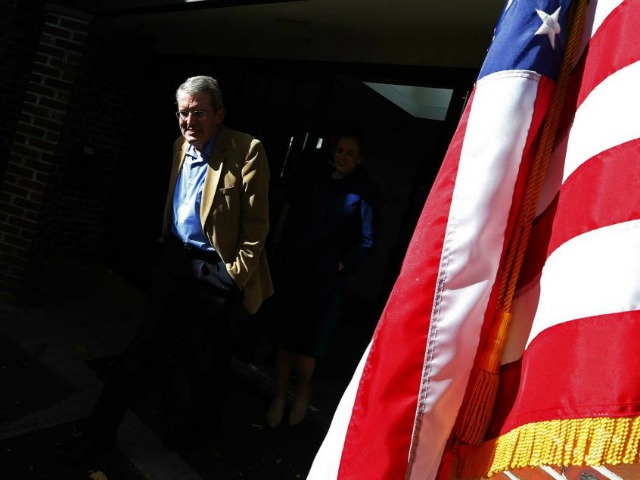Among the few shorelines bypassed by the mighty Republican “red wave” last week was New Jersey, where GOP Senate nominee Jeffrey Bell lost to incumbent Cory A. Booker by 13 percentage points.
The outlier yields lessons to a party seeking to win back the White House: Bell — a favorite son of conservative think tanks whose service to Republican presidents dates back to Richard Nixon — couldn’t ride the anti-Obama groundswell because he offered up all the wrong prescriptions for restoring middle-class jobs.
The bookish septuagenarian no doubt faced daunting odds: a deep-blue state that hasn’t elected a Republican to the Upper Chamber since 1972, and a youthful opponent who’s a darling of Wall Street, Silicon Valley, and Hollywood. Nonetheless, in a big GOP year, Booker was ripe for an upset. In office just a year, he’s an Obama clone ranking among the Senate’s most liberal members and better known for tweeting than legislating.
Meanwhile, Bell was regularly puffed by conservative voices, such as the Weekly Standard and the New York Post, who overstated his promise and poll standings, not to mention heavy weights like Steve Forbes, Robert P. George, and Larry Kudlow. George Will also tipped his hat to the underdog in his syndicated column.
Yet the political veteran underperformed on Election Day, capturing 42.4 percent of the vote, below Steve Lonegan’s 44.0 percent in last year’s special election and even less than Bell’s 43.1 percent tally in his 1978 loss to Bill Bradley.
So why couldn’t Bell give the former Newark mayor a serious challenge?
Even while being outspent 12 to 1, Bell proved curiously out of touch with the real concerns of the electorate. When the hottest issues of the year proved to be border security, amnesty, and Ebola, Bell headed off into political outer space; he campaigned for the gold standard, more immigration and guest-worker permits, and statehood for Puerto Rico. Amid all the exotica, Bell’s candidacy offered nothing tangible to anxious voters in a state that has ranked dead last in job creation since the Great Recession.
Indeed, Bell’s platform offers a case study of the insularity of conservative thought leaders in the post-Reagan era. They have dumped the proven Hamiltonian, nation-building model of political economy for discredited libertarian approaches such as open borders and trade schemes favoring rival nations — two sides of the globalization coin — that have, in Pat Buchanan’s words, “carpet-bombed Middle America and killed the Nixon-Reagan coalition that used to give the GOP 49-state landslides.”
While rightly protesting the Wall Street bailouts that have left Main Street high and dry, Bell stood with theorists Larry Kudlow and Stephen Moore in calling “the return of King Dollar” as a marker of a sound economy, not a millstone. In fact, his hyper-focus on the gold standard as the cure-all to our economic woes outdid even Sen. Rand Paul’s vitriol against the Federal Reserve.
In doing so, Bell departed from his former bosses. Presidents Nixon and Reagan understood that by making imports cheaper and our exports more costly, a “strong dollar” advances corporate interests of outsourcing U.S. manufacturing and middle-class livelihoods. Mindful of the middle-income base that elected them, these two-term presidents devalued the dollar relative to foreign currencies in response to competitors who were rigging the trade and monetary game at every opportunity. The Reagan-instituted Plaza Accord of 1985 was particularly effective, dramatically lowering the in-goods trade deficit by 1991.
In contrast, Bell seems unaware how economic independence was indispensable to America’s emergence as a military-industrial superpower with a bourgeoisie that was the envy of the world.
As much as he made “restoring middle-class prosperity” a campaign theme, Bell uttered not a discouraging word about the sell-off of bellwether sectors of the high-wage, private-sector U.S. economy — from aerospace and automobiles to steel and high-tech defense manufacturing — to foreign rivals since President Clinton ushered in the golden age of globalization in 1994.
Had he consulted with fellow New Jersey Republicans like Chris Smith and Frank LoBiondo, who won reelection to the U.S. House with 68 percent and 62 percent of the vote, respectively, Bell would have been warned that esoteric monetary theories don’t sell at the ballot box.
Rather, he needed a straightforward, easy-to-grasp plan to directly import jobs to the Garden State, such as investing in transportation infrastructure. Or turning New Jersey into a medical-research enterprise zone to find cures for diseases like Alzheimer’s, restoring the state’s former pre-eminence in the life sciences.
The irony — and tragedy — of Bell’s defeat is how the devout Catholic family man, who has fought the good fight on behalf of the sacredness of human life and holy matrimony, ended up in league with the anything-goes libertarians on economic issues.
Especially since these out-of-touch elites know nothing about nation-building, wealth creation, and recovering 20th-century American exceptionalism. Or about winning elections, as the policies they champion have effectively liquidated the GOP’s natural base of religious conservatives, Reagan Democrats, and middle-income voters.
The lesson for 2016, when the electoral map will be far more challenging for Republicans: Unless they are willing to learn from Jeff Bell’s second senatorial loss, don’t nominate or listen to libertarian ideologues more interested in peddling economic abstractions than creating jobs.
— Robert W. Patterson served in the administrations of President George W. Bush and Pennsylvania governor Tom Corbett. Follow him on Twitter @RWPatterson

COMMENTS
Please let us know if you're having issues with commenting.